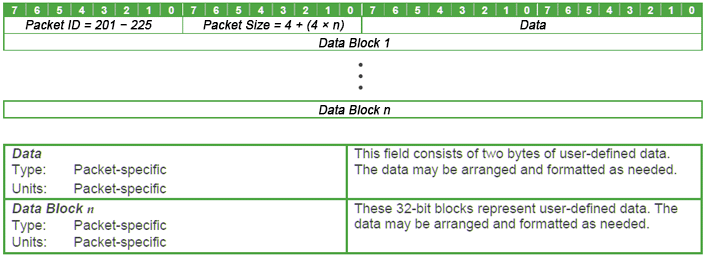Processing User-Defined Packets
Simulations often require extended communication, which is not covered by standard packets included in a certain communication standard or protocol (DIS, CIGI, etc.). So, custom (user-defined) packets are needed.
Such custom packets make it possible to extend basic functionality and add more flexibility to the system (e.g. when you need to display some avionics data).
UNIGINE IG enables you to define and process custom (user-defined) packets. The workflow is simple and similar for all communication protocols:
- Set a callback on receiving a certain packet. When IG receives a packet from the network, it creates an object of the appropriate class and passes it to the callback function.
- Inside the callback function, read and interpret the data of the class instance passed to it (depending on what was written to the packet on the host).
- Create and send a corresponding response packet, if necessary.
User-Defined CIGI Packets#
Just like with all other types of packets, to receive user-defined ones, we should add a callback for CIGI_OPCODE >= 201 (in accordance with CIGI ICD). On receiving such a packet, the callback shall be executed with CigiHostUserDefined * packet passed to it.
The CigiHostUserDefined class has the getData() method, which returns a set of bytes to be read and interpreted by the user (depending on what was written to the packet on the host).
The same situation is with sending packets. First, we ask the CIGIConnector to create a packet with a certain CIGI_OPCODE. If the code is equal to 201 or greater, a CigiIGUserDefined instance shall be returned. You can set bytes to be sent by calling the CigiIGUserDefined::setData() method.

Below is an example of working with user-defined CIGI packets:
using namespace Plugins;
int AppWorldLogic::init()
{
// ....
int index = Engine::get()->findPlugin("CIGIConnector");
// check CIGIConnector plugin load
if (index != -1)
{
// getting the CIGI interface
cigi = IG::CIGI::Connector::get();
// adding a callback for OPCODE = 202
cigi->addReceivePacketCallback(202, MakeCallback(this, &AppWorldLogic::on_recv_user_packet));
}
return 1;
}
// ....
void AppWorldLogic::on_recv_user_packet(IG::CIGI::CigiHostPacket * host_packet)
{
Log::error("AppWorldLogic::on_recv_user_packet\n");
CigiHostUserDefined * packet = dynamic_cast<CigiHostUserDefined *>(host_packet);
unsigned char * request_data = packet->getData(); // read
// ...
// creating a new IG user packet with opcode 203
CigiIGPacket * response_packet = cigi->createIGPacket(203);
CigiIGUserDefined * user_defined = dynamic_cast < CigiIGUserDefined *>(response_packet);
user_defined->setData(response_data, size_of_data); // write
cigi->addIGPacket(response_packet);
}Custom DIS PDUs#
In case of using DIS, custom Protocol Data Units (PDUs) are processed the same way as user-defined CIGI packets.
Below is an example of working with custom PDUs:
#include <PDU/Header.h>
#include <DataTypes/EntityType.h>
#include <PDU/Entity_Info_Interaction/Entity_State_PDU.h>
using namespace Plugins;
// ...
int AppWorldLogic::init()
{
// ....
int index = Engine::get()->findPlugin("DISConnector");
// check DISConnector plugin load
if (index != -1)
{
// getting the DIS interface
dis = IG::DIS::Connector::get();
// adding a callback for all packets
dis->setCallbackOnRecvPacket(KDIS::DATA_TYPE::ENUMS::Entity_State_PDU_Type, MakeCallback(this, &AppWorldLogic::on_recv_entitystate_packet));
dis->setCallbackOnRecvPacket(KDIS::DATA_TYPE::ENUMS::Other_PDU_Type, MakeCallback(this, &AppWorldLogic::on_recv_other_packet));
}
return 1;
}
// ....
void AppWorldLogic::on_recv_entitystate_packet(KDIS::PDU::Header *pdu)
{
if (pdu->GetPDUType() == KDIS::DATA_TYPE::ENUMS::Entity_State_PDU_Type)
{
KDIS::PDU::Entity_State_PDU *entity_state_pdu = static_cast<KDIS::PDU::Entity_State_PDU *>(pdu);
auto location = entity_state_pdu->GetEntityLocation();
auto linear_velocity = entity_state_pdu->GetEntityLinearVelocity();
auto appearance = entity_state_pdu->GetEntityAppearance();
// ...
}
}
void AppWorldLogic::on_recv_other_packet(KDIS::PDU::Header *pdu)
{
// ...
}